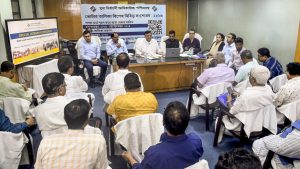Democracy under question in India as the Election Commission’s Special Intensive Revision (SIR) of voter lists faces allegations of bias and manipulation. Congress calls it a threat to democratic integrity, demanding transparency and public oversight.
Qalam Times News Network
Kolkata | October 29, 2025
The Controversy Over India’s Voter List Revision Raises Questions About the Spirit and Survival of Democracy

Democracy — the soul of a republic — loses its meaning when the process of election, its very lifeblood, falls under suspicion. When the Election Commission of India (ECI) announced the Special Intensive Revision (SIR) of electoral rolls across 12 states and Union Territories from October 28, the Congress Party didn’t just protest; it struck a chord that resonates deep within the conscience of every democratic citizen. The party accused the ECI of turning democracy’s core mechanism into a political weapon — a systematic attempt to manipulate voter lists in favor of those in power.
Congress leader Pawan Khera’s pointed questions echo across the national landscape: if the SIR process in Bihar wasn’t transparent, what lessons did the Commission learn? Why repeat the same method despite Supreme Court criticism? Is it mere coincidence that democracy finds itself tested just as elections draw near?
The ECI defends its move as an effort to ensure “accuracy.” But who defines accuracy when millions of voters—largely from marginalized, minority, and backward communities—find their names missing? When “correction” begins to resemble exclusion, democracy starts to look less like participation and more like control.
In Bihar alone, 6.9 million voters disappeared from the rolls. Even the Supreme Court acknowledged a lack of transparency. Yet, the Commission insists on repeating the same process — a decision that appears more obstinate than objective. If political pressure is indeed shaping this insistence, as Congress claims, then the independence of India’s Election Commission risks becoming a hollow symbol.
Take the case of Karnataka’s Aland Assembly seat: out of 6,018 deleted names, only 24 were genuinely invalid — a 99% error rate. Whether by mistake or by design, this is not democracy at work; it’s democracy under threat.
Interestingly, while the Congress and Left parties call this exercise an “assault on democracy,” West Bengal’s Trinamool Congress has adopted a softer stance. Chief Minister Mamata Banerjee’s silence is striking, especially as over 500 officials, including 70 IAS officers, were suddenly transferred. Administrative coincidence, or political prelude?
Meanwhile, the CPI(M) has urged transparency at the booth level, and the Bengal Congress has criticized the ECI’s “non-consultative” approach, demanding all-party meetings. Predictably, the BJP supports the SIR process. Opposition leader Suvendu Adhikari claims that over a crore “non-existent” or “infiltrator” voters will be removed — a statement loaded with communal undertones that history has seen before.
At its heart, Congress’s argument isn’t opposition for opposition’s sake. It’s about democracy’s integrity. When voter list manipulation becomes normalized, the system begins to poison itself from within. If the ECI truly stands as an independent constitutional body, it must release the Bihar review findings and open every stage of the SIR process to public scrutiny.
Because this isn’t just about names on a list. It’s about the dignity of the vote — the foundation of democracy itself. When that foundation cracks, elections become rituals, not revolutions. And no nation can thrive on rituals alone.







